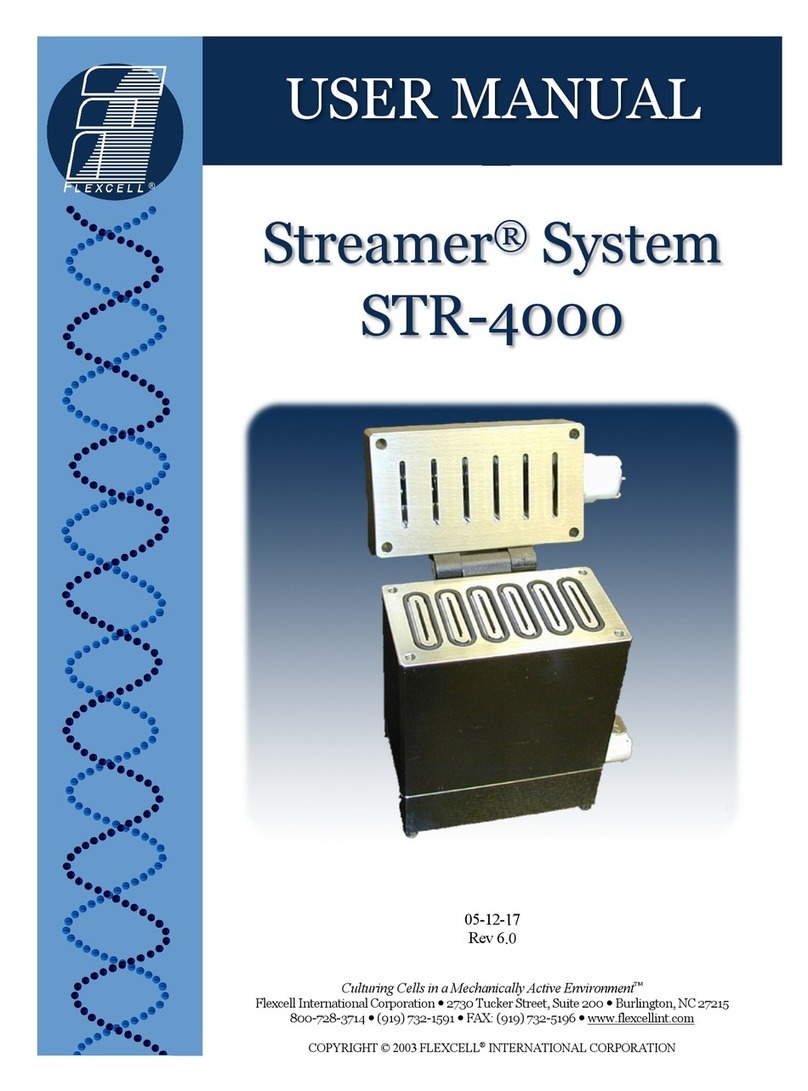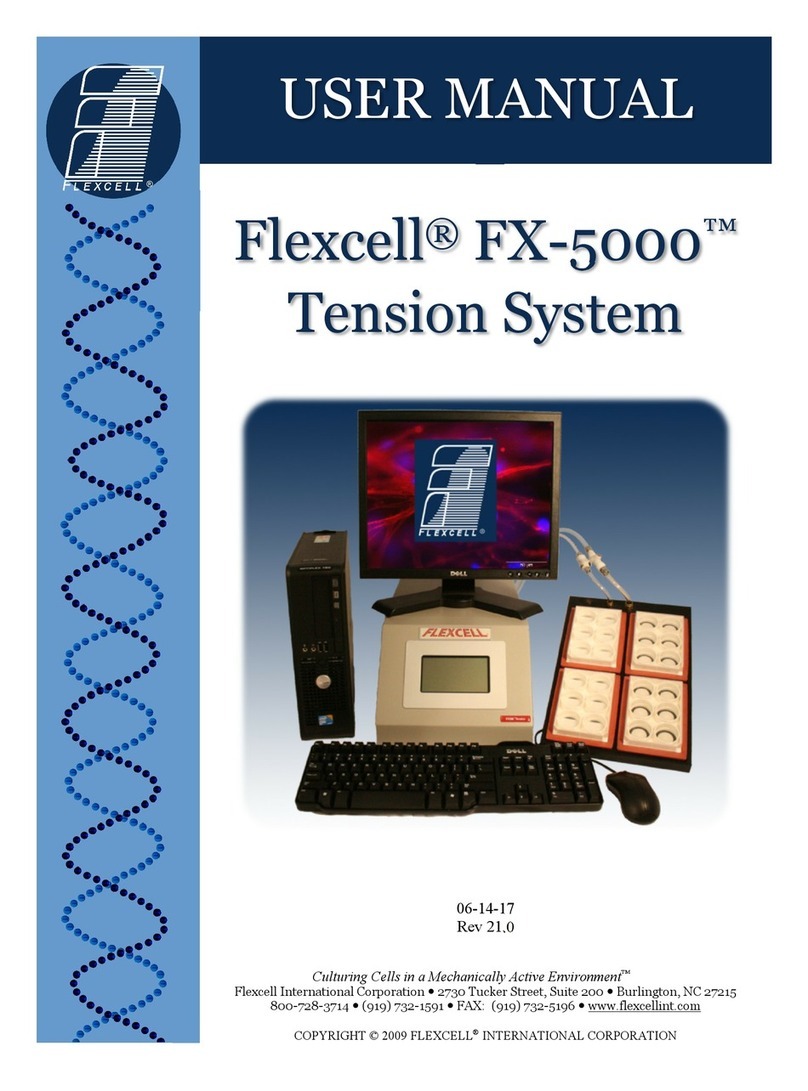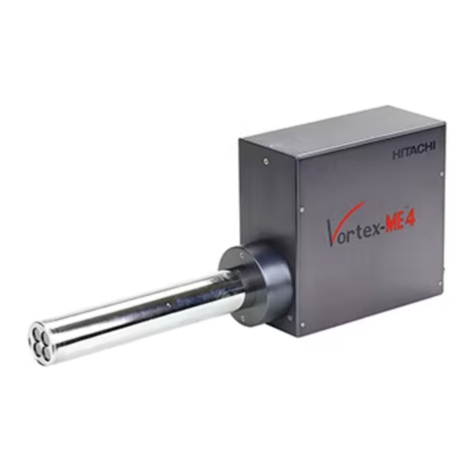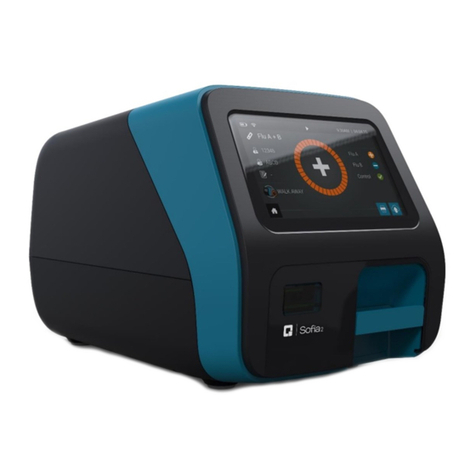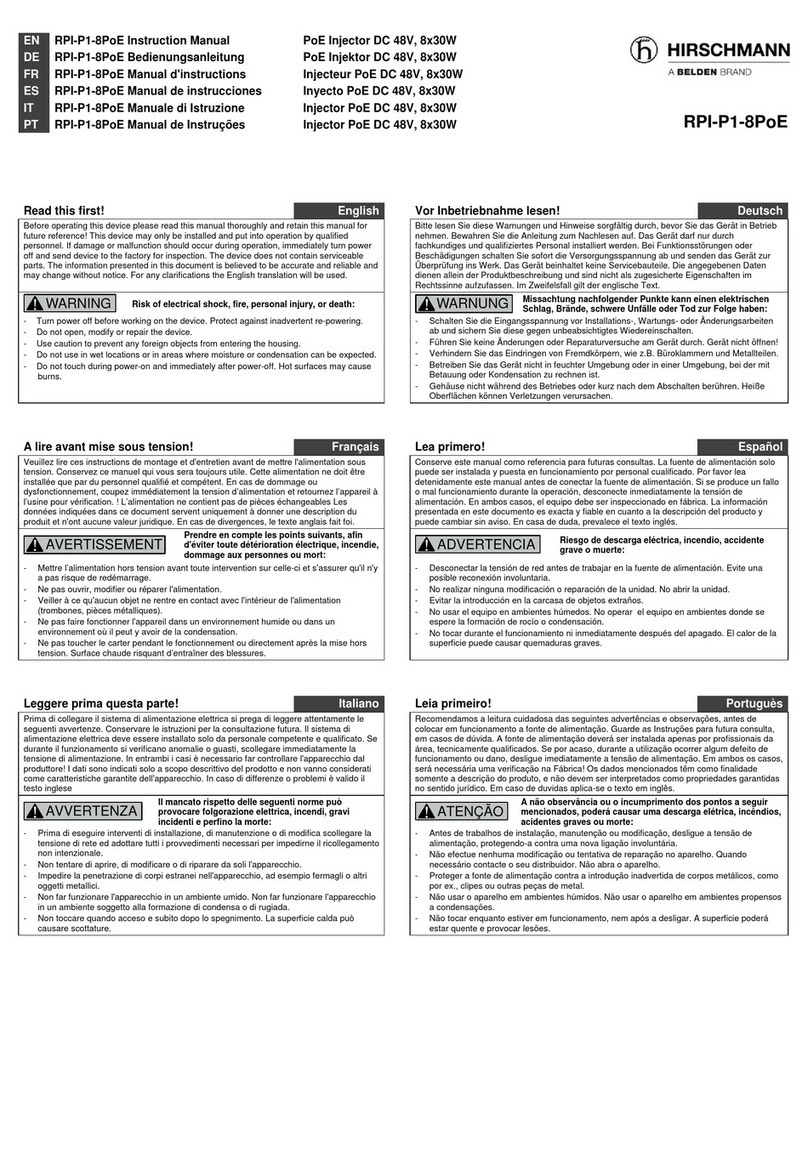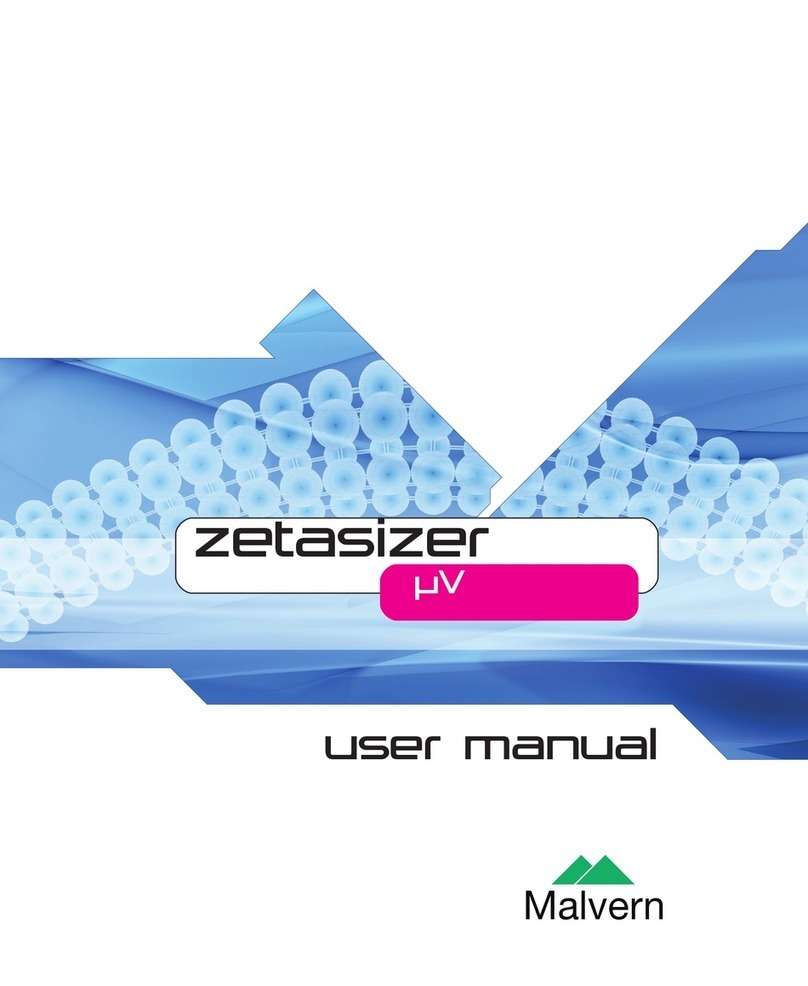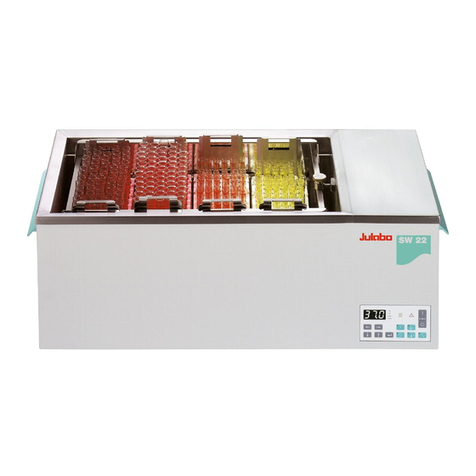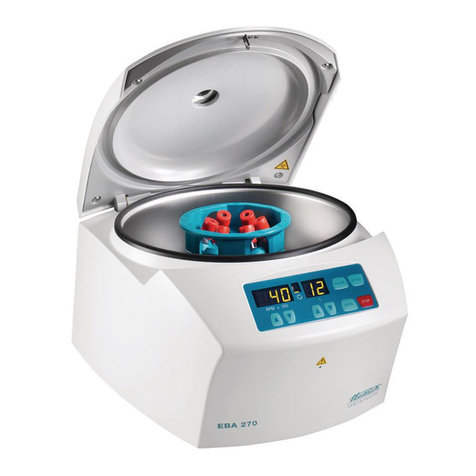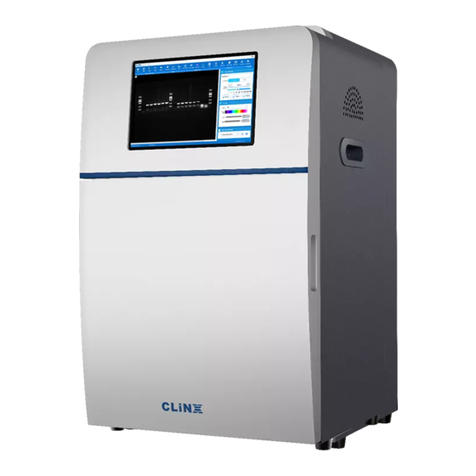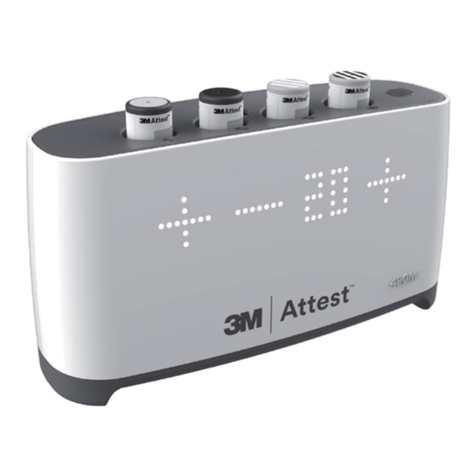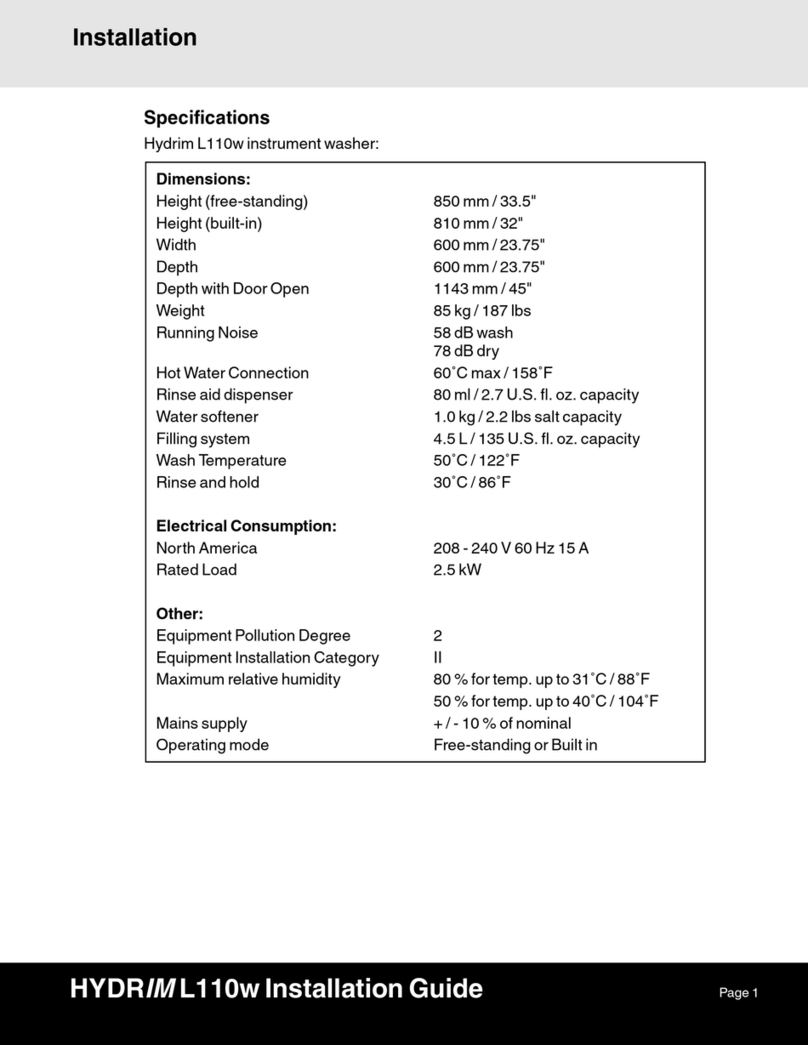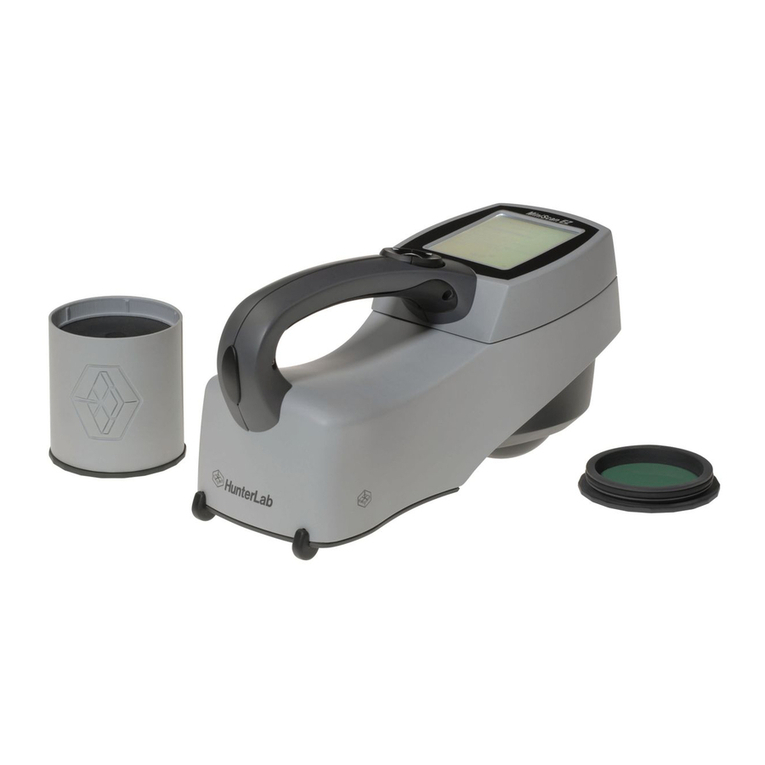flexcell Flex Jr. User manual

USER MANUAL
Flexcell®Flex Jr.™
Tension System
11-08-2018
Revision 13.1
Culturing Cells in a Mechanically Active Environment™
Flexcell International Corporation 2730 Tucker Street, Suite 200 Burlington, NC 27215
800-728-3714 (919) 732-1591 FAX: (919) 732-5196 www.flexcellint.com
COPYRIGHT © 2009 FLEXCELLINTERNATIONAL CORPORATION

FLEXCELL®INTERNATIONAL CORPORATION
i
TABLE OF CONTENTS
One Year Limited Parts Warranty ................................................................................................ii
Acer Laptop Computer Warranty Information............................................................................iii
Federal Communications Commission Radio Frequency Interference Statement ......................iv
Flex Jr.™Quick Start Instructions.................................................................................................v
1. Flexcell®Flex Jr.™Tension System Components.......................................................1
2. Setup of the Flexcell®Flex Jr.™ Tension System........................................................1
2.1 Packing List ......................................................................................................................1
2.2. Location of the Flex Jr.™Tension System.......................................................................1
2.3 Setup of the Computer and the Flex Jr.™Tension FlexLink®..........................................2
2.4 Connection to Microscopy Devices..................................................................................4
2.5 Connecting the System Vacuum Lines.............................................................................3
2.6 FlexSoft®Flex Jr.™V2.0 Software and System Power-up...............................................4
2.7 LCD Display on the Flex Jr.™Tension FlexLink®...........................................................5
2.8 Using Additional Flex Jr.™Tension FlexLinks®..............................................................5
3. Operation Instructions........................................................................................................6
3.1 Starting the Flex Jr.™Program..........................................................................................6
3.2. Using the Flex Jr.™Tutorial.............................................................................................6
3.3 Main Display Window......................................................................................................7
3.4. Configuring Users............................................................................................................8
3.5 Creating Regimens............................................................................................................9
3.6 Creating a Regimen with a Custom Waveform Shape ...................................................10
3.7 Assigning Regimens .......................................................................................................11
3.8 Starting Regimens...........................................................................................................12
3.9 Simulating Regimens......................................................................................................12
3.10 Pausing Regimens.........................................................................................................12
3.11 Resuming Regimens .....................................................................................................12
3.12 Stopping Regimens.......................................................................................................12
3.13 Determine the Progress of the Regimen .......................................................................13
3.14 Resetting the FlexLink®................................................................................................13
3.15 Data Analysis................................................................................................................13
3.16 Shutting Down the System ...........................................................................................14
3.17 Exiting the Flex Jr.™Program ......................................................................................15
4. Addendums to the Flex Jr.™Tension System ............................................................16
For Optimal Performance of the Tension unit......................................................................16
5. System Troubleshooting..................................................................................................17
6. Waveform Shape Definitions.........................................................................................19
7. Flexcell®Flex Jr.™Tension System Specifications..................................................20
8. Recommended Maintenance for the Flex Jr.TM .........................................................22

FLEXCELL®INTERNATIONAL CORPORATION
ii
ONE YEAR LIMITED PARTS WARRANTY
Flexcell®Flex Jr.™Tension System
1. FLEXCELL INTERNATIONAL CORPORATION warrants to the original purchaser/customer all hardware components of the FlexcellFlex Jr.Tension
System serial #___________________________for a period of one year from the date of shipment to the purchaser/customer to be free from manufacturing
defects in workmanship or materials with the following exceptions, terms and conditions:
a. ITEMS EXCLUDED FROM THE WARRANTY ARE: Dell OptiPlex desktop computer and monitor*, software, disks, manuals and external
peripherals such as printers, mouse or track ball units, imaging devices, vacuum pumps, air tanks, electric voltage converters, compressors, surge
suppressers and all other accessory equipment.
b. DURING THE WARRANTY PERIOD, the purchaser/customer must notify Flexcell of any warranty claim in writing, by telephone, fax transmission
or email identifying each defective part or specifically describe the exact problem no later than the last day the warranty is in effect. Purchase/customer
must run the drying regimen as recommended in this manual or the warranty will be void. Prior to warranty claim or repair, the purchases/customer
must speak to Flexcell Tech Support, where upon the purchaser/customer will be given directions on how to email a copy of the appropriate tech
support files to Flexcell.
c. FLEXCELL AGREES to correct any defect in workmanship or material and supply new or rebuilt parts in exchange for defective parts upon
completion and submission by purchaser/customer of a printed “Parts Return Authorization” form furnished by Flexcell. Parts must be properly
packed in original container and shipped to our factory service center or distributor with all shipping costs prepaid if the unit is out of warranty
coverage. If the original shipping box is not available, Flexcell will send the required protective shipping container. (Flexcell will recommend the
insurance value for parts or equipment to be shipped.) Return carrier shipping costs within the US and Canada will be paid by Flexcell from the
service center. All other shipping costs outside of the US and Canada will be paid by the purchaser/customer. The purchaser/customer is solely
responsible for payment of custom fees, taxes, holding fees or value added taxes.
d. THIS LIMITED WARRANTY only covers failures due to defects in materials or workmanship which occur during normal use. It does not cover
damage which occurs in shipment or failures of original equipment due to products identified as add-ons not manufactured by Flexcell International
Corporation or its distributors nor does this limited warranty cover damages or failures which result from accident or disaster such as fire, explosion,
flood, wind, lightning, or earthquake or misuse, abuse, neglect, mishandling, misapplication, alteration, faulty installation, modification or service
by anyone other than our factory or distributor. Breaking the seal and opening the unit case or violating unit components will void the warranty.
Failure to run the drying regimen as recommended in this manual will void the warranty. This warranty is extended only to the original
purchaser/customer unless a transfer of ownership is approved by Flexcell in writing.
e. LIMITED LIABILITY. Flexcell or its distributor’s only liability shall be to remedy any defect to comply with its warranty and return the repaired
equipment to function as designed. Under no circumstances shall Flexcell or its distributors be liable for any special incidental or consequential
damages based upon breach of warranty or contract or negligence. Such damages include, but are not limited to: loss of profits, revenue, loss of data,
down time, customer’s material or time.
f. DISCLAIMER OF WARRANTIES: The Limited Warranty expressed in the foregoing language is the only warranty applicable to this product. Any
other warranty, expressed or implied warranty or of merchantability or fitness for a particular purpose are hereby disclaimed. No oral or written
information or advice provided by Flexcell, through its agents or employees, in the use and functioning of the equipment shall in any way create a
warranty or in any way increase the scope of this limited warranty.
g. DISCLAIMER: LANGUAGE. This warranty document, accompanying instruction manual and supplemental applicable laws appear in the English
language. In the event of any inconsistency in the meaning of the words and terminology and any foreign language translation, the English language
shall prevail.
2. GOVERNING LAW. The performance of the duties and liabilities of the parties under the terms and conditions of this Limited Warranty shall be governed in
all respects by the laws of the State of North Carolina, the United States of America.
APPLICATION OF STATE LAWS: Some states do not allow the exclusion or limitation of consequential damages nor do some states allow limitations on
how long an implied warranty lasts, so the above limitations may not apply to you. This warranty gives you specific legal rights and you may also have other
rights that vary from state to state.
3. INTERNATIONAL CUSTOMERS. The full text of the foregoing limited warranty and all disclaimers is applicable to international customers/purchasers
except when the purchase was made from an international distributor or reseller, the warranty will be covered through your distributor or reseller.
If technical advisory support service is not available through your distributor or reseller, for service contact warranty headquarters by phone or fax.
Within the United States only: 1-800-728-3714 (toll free) - Fax: 1-919-732-5196
International Customer’s telephone: 01-919-732-1591 - Fax: 01-919-732-5196
FLEXCELL INTERNATIONAL CORPORATION
2730 Tucker Street, Suite 200, Burlington, NC 27215
1-800-728-3714 (within the U.S. only) 1-919-732-1591 fax: 1-919-732-5196 http://www.flexcellint.com
*Customers should contact Dell Inc. for all warranty questions or concerns with regards to the Dell OptiPlex computer and monitor.

FLEXCELL®INTERNATIONAL CORPORATION
iii
COMPUTER WARRANTY INFORMATION
Dear Customer:
Congratulations on your purchase of the Flexcell®Dynamic Culture System: Flex Jr.™Tension
system. This system comes with a one (1) year warranty on the hardware manufactured by Flexcell®
International Corporation. Please do not openthe sealed Flex Jr.™FlexLink®instrument case. Doing so will
void the warranty provided through Flexcell®International Corporation.
The Acer Aspire Laptop that is provided with the Flexcell®Dynamic Culture System: Flex Jr.™Tension
system comes with a 2-year extension of limited warranty plus a 3-year next-business-day limited on-site
service through ACER. This warranty applies to the continental U.S. and Canada only and may not be
available in all locations. Please see the warranty information provided with the Acer laptop for the terms
and conditions of this extended warranty.

FLEXCELL®INTERNATIONAL CORPORATION
iv
FEDERAL COMMUNICATIONS COMMISSION
RADIO FREQUENCY INTERFERENCE STATEMENT
This computing equipment has been type-tested and found to comply with the limits for a Class B digital
device in accordance with the specifications for Subpart J of Part 15 of FCC Rules. These limits are
designed to provide reasonable protection against harmful radio and TV interference in a residential
installation. There is no guarantee that interference will not occur in a particular installation.
The following instructions and precautions must be observed by the user when installing and operating this
device:
1. The equipment must be operated in strict accordance with the manufacturer's
instructions.
2. The unit(s) must be plugged into a properly-grounded power outlet and used with the
power cord supplied with the unit(s), unmodified.
3. The unit must be operated with the factory-installed cover in place.
4. No modifications of the equipment can be made which may result in the equipment
failing to meet the limits of the FCC Rules.
5. The equipment must be maintained in a satisfactory state of repair.
6. Shielded cables must be used with this equipment to ensure compliance with the FCC
Rules.
If the unit interferes with radio or television reception (which can be tested by turning the unit off and on)
the user is encouraged to try the following procedure to correct the interference:
1. Reorient the antenna of the receiver.
2. Relocate the equipment to increase the distance between the unit and the radio/TV.
3. Connect the unit to an outlet on a different circuit from the receiver.
4. Consult with the dealer or an experienced radio/TV technician for advice on ways to
reduce interference.

FLEXCELL®INTERNATIONAL CORPORATION
v
Flex Jr.QUICK START INSTRUCTIONS
1. Choose a lab location for the Flex Jr.™
System that is near, and adjacent to the
incubator in the cell culture area.
2. Place the Flex Jr.™FlexLink®on a sturdy, flat
surface.
3. Connect the FlexLink®to the Ethernet port
on the side of the laptop using the Ethernet
cable supplied (see Fig. 3, p.2).
4. Connect the FlexLink®and laptop power
cables to a surge-protected power source.
5. Remove the white plugs from the four ports
on the back of the FlexLink®.
6. Connect the pressure reservoir to the
SYSTEM port on the back of the FlexLink®
and check the system vacuum supply. If you
do not have a pressure reservoir, connect the
SYSTEM tubing directly to the vacuum
source. See section 2.6 (p. 5) for
recommended vacuum pump specifications.
7. Place the water trap (see Fig. 1, p. 2) in-line
with the FLEX OUT tubing:
a. Make cuts in the tubing for the water trap
to be positioned as near as possible to the
baseplate, outside of the incubator, so
that the water will be trapped away from
the FlexLink®.
b. Place the water trap at a position below
the FlexLink®unit.
8. Cut a 10' (3 m) length of the ¼” (6.4 mm)
tubing and connect to the FLEX IN port on
the rear of the FlexLink®. Attach provided
quick disconnect to the other end of the
tubing.
9. Use the ⅜” (9.5 mm) tubing and connect to
the FLEX OUT port on the rear of the
FlexLink®.
a. Cut the tubing to a length that will reach
the water trap and connect the open end
to the controller (labeled CTRL) side of
the water trap.
b. Connect a length of ⅜” (9.5 mm) tubing
to the baseplate (labeled BPLT) side of
the water trap.
c. Cut the tubing to a length that will reach
the baseplate in the incubator and attach
the provided quick disconnect to the open
end of the tubing.
NOTE: The overall length of the FLEX OUT
tubing should not exceed 10’ (3 m).
10. Setup the baseplate:
a. Place the Loading Stations into the
baseplate well and apply lubricant to the
tops of the white buttons of the loading
posts.
b. Place the gasket on the BioFlexplate
and place a BioFlex®plate and gasket in
the baseplate well.
11. Place the baseplate in the incubator:
a. Insert the ¼” (6.4 mm) and ⅜” (9.5 mm)
tubing into the access opening of the
incubator.
b. Connect the quick disconnects for the ¼”
(6.4 mm) and ⅜” (9.5 mm) tubing to the
baseplate(s).
12. Turn the FlexLink®and computer system
ON. The Windowsdesktop should appear
on the monitor. Double click on the Flex Jr.™
V2.0 icon on the left-hand side of the screen
to start the software.
13. In the Configure menu, select User Editor
and register as a user.
14. In the Regimen menu, select Create new and
create a regimen by entering values into the
appropriate spaces or click on the Run
Wizard button in the bottom left-hand corner
for a step-by-step procedure. When
completed, click on Save Regimen. Exit the
regimen editor.
15. In Controllers menu, select the appropriate
FlexLink®number to which the regimen will
be downloaded.
16. In the Regimen menu, select Assign. Choose
the proper platform, user, and regimen from
the drop-down menus (see section 3.7, p. 11
for assignment instructions). Confirm with a
Yes to download the regimen.
17. Once the program is downloaded, click on
Simulate in the main window display. Once
satisfied that the regimen is correct, click on
Stop.

FLEXCELL®INTERNATIONAL CORPORATION
vi
18. Turn ON the vacuum system. Be sure that the
vacuum level is at -90 kPa. Click on Start to
run the regimen. The plate should begin
flexing. Make a visual check to verify
membrane movement.
19. To pause or stop the regimen, click on Pause
or Stop at any time. Otherwise, the program
will stop when the regimen is completed.
20. Check the Water Trap prior to each
experiment to see if water is accumulating.
Empty the Water Trap before it is more than
half full.

FLEXCELL®INTERNATIONAL CORPORATION
Copyright
©
2009 Flexcell International
FLEXCELL, BioFlex, FlexLink and FlexSoft are trademarks of Flexcell International Corporation. MS Windows and MS Office are trademarks
of the Microsoft Corporation. Adobe Acrobat is a trademark of Adobe Systems Inc. Dell OptiPlex is a trademark of Dell.
General Notice: Other product names mentioned in this manual are for identification purposes only and may be trademarks of their respective
owners. Flexcell International disclaims any and all rights in those marks.
1
1. FLEXCELL®FLEX JR.TENSION SYSTEM COMPONENTS
1. Flex Jr.™Tension FlexLink
2. Laptop computer with preinstalled
software:
FlexSoft®Flex Jr.™V2.0
Microsoft Windows10
Do not delete any software or change any
settings on this computer. It has been pre-
configured to operate the FlexSoft®Flex
Jr.™software.
3. FlexLinkpower cable
4. Ethernet cable
5. FlexcellSingle Plate BioFlex®vacuum
baseplate
6. Gasket
7. 25mm Loading Station
8. BioFlex®Cells Seeder Loading Station
9. Silicone lubricant
10. System drying filter
11. 20 ft. small blue tubing (¼” (6.4 mm)
O.D.) for FLEX IN connection
12. 20 ft. clear blue tubing (⅜” (9.5 mm)
O.D.) for FLEX OUT connection.
13. 20 ft. clear green tubing (⅜” (9.5 mm)
O.D.) for SYSTEM (vacuum source)
connection
14. User manual and other ancillary manuals
for computer and monitor
15. Surge protected outlet strip
16. Water Trap
17. Vacuum source (optional)
2. SETUP OF THE FLEXCELL®FLEX JR.™TENSION SYSTEM
Do not power up the Flexcell®Flex Jr.™
Tension system until all connections among
components have been properly made and
checked! Never power up the computer or
the Flex Jr.™Tension FlexLink®with the
cover removed - an electrical shock hazard
exists. Operation of the computer without
the cover is in violation of FCC regulations
and will void the warranty!
2.1 PACKING LIST
Remove the packing list and check off the
instrument components as they are removed
from the shipping containers. If any parts are
missing, contact Flexcell®International Corp.
immediately.
2.2 LOCATION OF THE FLEX JR.™
TENSION SYSTEM
Choose a location for the Flex Jr.™Tension
system (Fig. 1) that is adjacent and as close
as possible to the CO2incubator (or
microscope) and vacuum source. A shorter
distance in vacuum lines decreases the air
flow resistance for elongation and release of
the flexible bottomed culture plate, allowing
for a greater range of flexing at higher
frequencies. All tubing and the Ethernet
communications cable connect to the rear of
the Flex Jr.™Tension FlexLink®(Fig. 2).
The length of the tubing from the FlexLink®
to the baseplate (or microscope) device
should be 10' (3 m) long to assure proper
system performance. This length can vary if
needed, but no more than 5' (1.5 m) longer
or shorter. Cut the tubing after the system is
fully set up to ensure of the proper length.

FLEXCELL®INTERNATIONAL CORPORATION
2
Figure 1. Flexcell®Flex Jr.™Tension System.
1) Surge protected power strip, 2) power outlet,
3) Ethernet cable, 4) reinforced vacuum tubing,
5) compressed air regulator/filter, 6) 3/8” VENT
tubing, 7) 3/8” SYSTEM tubing, 8) 1/4” FLEX IN
tubing, 9) 3/8” FLEX OUT tubing, 10) water
trap, 11) baseplate, and power cables.
Figure 2. Flex Jr.™Tension FlexLink®rear
view
The Flex Jr.™Tension system will require a
space 25.0” (63.50 cm) wide by 10.25” (26.04
cm) deep if the computer, Flex Jr.™Tension
FlexLink®and monitor are placed side by
side. The total weight ofthe system is 16.4 lbs.
(7.44 kg).
Figure 3. A) Acer Aspire laptop right side
view. B) Acer Aspire laptop left side view. C)
Connected Ethernet cable.
2.3 SETUP OF THE COMPUTER AND
THE FLEX JR.™TENSION
FLEXLINK®
Setup the Acer laptop computer according to
the manufacturer’s instructions. Refer to
Figures 1-6 for proper setup of the Flex Jr.™
system instruments. Place the Flex Jr.™
Tension FlexLink®next to the computer and
connect the FlexLink®to the computer via
the Ethernet cable provided (Fig. 3).
If additional FlexLinks®have been
purchased, they are to be placed side by side.
For multiple FlexLinks®to be controlled by
one computer, connect the Ethernet cable
from each FlexLink®to an Ethernet hub.
Then, connect thehub to the Ethernet port on
the back of the computer.

FLEXCELL®INTERNATIONAL CORPORATION
3
Remove the four red securing clips from the
ports on the back of the FlexLink®. Evenly
apply pressure to the black release rings and
remove the four white plugs from the four
ports on the back of the FlexLink®(Fig.4).
These plugs should be saved and re-used
when storing the FlexLink®for an extended
period of time. Prior to storing, be sure to run
a drying regimen before inserting the plugs
(see section 3.16).
Figure 4. Flex Jr.TM FlexLink®rear view.
A) White plugs with red securing clips in the
ports. B) Red securing clips and white plugs
removed from the ports. C) Power, pump
control, Ethernet cable, and tubing connections
with red securing clips.
Connect the system tubing as follows (Fig. 1
& 4):
1. Connect the ⅜” (9.5 mm) O.D. green
tubing from the pressure reservoir or
vacuum source to the SYSTEM port on
the back of the FlexLink®.
2. Attach the free end of the blue ⅜” (9.5
mm) tubing to the FLEX OUT port on
the back of the FlexLink®.
3. Attach the FLEX IN moisture indicator
to the FLEX IN port on the back of the
FlexLink®.
4. Attach the blue ¼” (6.4 mm) tubing to
the free end of the FLEX IN moisture
indicator connector.
5. VENT port should be left open.
6. Connect the Water Trap in-line with the
blue ⅜" tubing when running static
regimens. See the Addendum (p. 15,
"B") for further details concerning the
placement of the Water Trap.
NOTE: When connecting the tubing to the back
of the FlexLink®, push the tubing firmly into the
quick release ports. Apply the red securing ring
under the black release ring on the ports. To

FLEXCELL®INTERNATIONAL CORPORATION
4
verify the tubing is securely fastened, hold the
back of the FlexLink®and apply a light pulling
force to each tubing to make sure they do not come
loose. The ¼” O.D. blue tubing should be secure
when approximately ½” of the tubing is in the
port. The ⅜” O.D. blue tubing should be secure
when approximately ¾” of the tubing is in the
port.
Connect the power cables (115 VAC or 230
VAC) to the rear power inlet (FLEXLINK
POWER) of the FlexLink®(Fig. 4). When the
instruments are completely set up, the power
cords should be connected to a surge
protected power strip and then to a 115 VAC
or 230 VAC, 60 Hz power outlet.
2.4 CONNECTION TO MICROSCOPY
DEVICES
Use the tubing adapter as shown in Figure 4 to
connect the Flex Jr.™to the microscope
device. Connect the ¼” (6.4 mm) blue tubing
provided with the deviceto the front hose barb
on the device. Then connect the open end to
the tubing adapter. Next, connect the ⅜” (9.5
mm) and the ¼” (6.4 mm) quick disconnected
tubing, already attached to the adapter, to the
respective FLEX IN and FLEX OUT tubing
from the rear of the Flex Jr.™.
Figure 5. Microscope device to Flex Jr.™tubing
adapter
2.5 CONNECTING THE SYSTEM
VACUUM LINES
Connect the blue ⅜” (9.5 mm) vacuum inlet
tubing to a vacuum source. A vacuum pump
capable of producing a maximum vacuum of
-100 kPa and a flow rate of, at least, 5.7
ft3/min (161 L/min) is necessary for optimal
performance.
Keep the tubing length between the vacuum
source and FlexLink®as short as possible.
Also, keep in mind that some vacuum
systems will vary in flow rate and/or
pressure level. To eliminate or reduce this
effect, use of a pressure reservoir between
the vacuum source and the Flex Jr.™Tension
FlexLink®is recommended.
Flexcell®International Corp. recommends
the Leybold Trivac D8B Pump vacuum
pump (includes the D8B pump system,
power cable, gas ballast valve and AR 4-8
return filter) as a vacuum source as well as
using a pressure reservoir. The vacuum
pump and pressure reservoir can be
purchased directly from Flexcell®
International Corp.
NOTE: Even with an optimal vacuum source,
there will still be some system limitations due to
airflow. Combinations of high frequencies and
% elongations may not be achievable due to the
high vacuum level in the short period of time
requested. The exact output is dependent on
many system variables. See the Addendum on
page 15 for suggestions on maximizing system
performance.
To Flex Jr.
To microscope device

FLEXCELL®INTERNATIONAL CORPORATION
5
2.6 FLEXSOFT®FLEX JR.V2.0
SOFTWARE AND SYSTEM POWER-UP
The FlexSoft®Flex Jr.™V2.0 software
(Flexcell®Copyright Protected Software,
Property of Flexcell®International
Corporation, 2730 Tucker Street, Suite
200, Burlington, NC 27215) has been pre-
installed on the hard drive.
Be sure to shutdown Windowsproperly
by using the Shut Down command activated
by the Start button. Failure to follow the
above directions can cause software and
hardware malfunctions.
The computer has Windows10 installed on
the hard drive. All backup software is
provided with the system. Check all
connections and connect the surge protector
into an appropriate power outlet (115 VAC or
230 VAC). Turn ON the surge protector strip
and check that the indicator light on the strip
is lit. If the power light does not come on, the
surge protector has failed. Replace the surge
protector and attempt to determine what
caused the surge protector to fail. Turn ON the
power switches on the computer and Flex Jr.™
Tension FlexLink®. The system should then
boot and load Windows®. Double click on the
Flex Jr.™V2.0 icon to begin using the
software.
NOTE: Flexcell®recommends that the power
saving or screen saver features in the Windows®
software are disabled. Allowing the hard drive to
power down while an experiment is running may
create the need to reboot the computer before data
can be viewed, or before a regimen can be
downloaded again. It is recommended that the
monitor be put in “sleep” mode when not in use
and that the computer be allowed to run at full
power during an experiment.
2.7 LCD DISPLAY ON THE FLEX JR.™
TENSION FLEXLINK®
The front of the Flex Jr.™Tension FlexLink®
box has an LCD graphic display. When the
Flex Jr.™Tension FlexLink®is turned ON,
the LCD will display the FlexLink®number
(i.e., #1 or #2) and the regimen status (i.e.,
Idle, Ready, or Left (the time remaining, in
minutes, of a running regimen). When a
regimen has been downloaded and/or is
running, the LCD will display the time left
(in Days:Hours:Minutes). See Table 1,
below, for the display messages with various
FlexLink®statuses.
Table 1. Messages displayed on the Flex Jr.™
Tension FlexLink®LCD.
FlexLink Status
LCD message
Power ON
#1 IDLE
Regimen downloaded
#1 READY
Regimen is running
or being simulated
#1 TIME LEFT
DD:HH:MM
Regimen has stopped
#1 READY
2.8 USING ADDITIONAL FLEX JR.™
TENSION FLEXLINKS®
Using additional Flex Jr.™Tension
FlexLinks®will allow two different
regimens to run simultaneously. All tubing
connections made to the first FlexLink®
should be made exactly the same with the
additional FlexLink®. Each FlexLink®will
have its own separate FLEX IN and FLEX
OUT tubing for each platform. However, the
SYSTEM tubing can be shared between
FlexLinks®with "T" fittings as long as the
vacuum source is capable of running two
FlexLinks®with the programmed regimens.
Regimens with a combination of high
frequencies and % elongation levels will
require a more powerful vacuum source. The
capability of the vacuum source with more
than one FlexLink®will need to be tested

FLEXCELL®INTERNATIONAL CORPORATION
6
experimentally with the user’s particular
setup. FlexLinks®must be placed side-by-side
during use.
To connect an additional FlexLink®to the
computer, connect the Ethernet cable from
each FlexLink®to an Ethernet hub. Then,
connect the hub to the Ethernet port on the
back of the computer using the Ethernet
communications cable provided. The LCD on
the front of the FlexLink®will display the
number (#1 or #2) that the Flex Jr.™Tension
FlexLink®has been assigned at the time of
production.
NOTE: The numbering of each Flex Jr.™
Tension FlexLink®will not depend on what
order it appears in the connection chain, but
according to the configuration of each
FlexLink®as "FlexLink #1, FlexLink #2" during
production.
When powering up the FlexLink®(s) and
computer, turn the FlexLink®(s) ON before
the computer. To use a particular FlexLink®,
select the appropriate FlexLink®number (#1
or #2) from the Controllers menu. Assign,
download, and run regimens just as would be
done when using one FlexLink®.
3. OPERATION INSTRUCTIONS
DISCLAIMER: Although the Flexcell®System
can be programmed to simulate most of the strain
profiles that describe those profiles found in vivo,
it may not be possible to achieve each waveform
with peak frequency or strain levels in every case.
Due to the limitations of the Flex Jr.™System,
including limits of maximum elongation in the
silicone elastomer membrane, rebound of the
membrane, friction and frequency, all waveforms
cannot be reproduced accurately at every
frequency and percent elongation. The lower the
frequency the more accurate the waveform shape
will be for higher % elongation values. To
increase performance, Flexcell®recommends
shortening the tubing length as much as possible
between the vacuum source and the baseplate. See
page 15 for more information on obtaining the
optimal performance of your Flex Jr.™System.
3.1 STARTING THE FLEX JR.™
PROGRAM
The Flexcellsystem should now be set up
and ready for operation. Be sure that the
system vacuum supply is adequate to operate
the instrument(s) (see section 2.5).
Turn ON the power switch on the computer
and Flex Jr.™Tension FlexLink®. The
system should then boot and load
Windows®. Select and double click on the
Flex Jr.™icon (Fig. 6) on the desktop to start
the FlexSoft®Flex Jr.™software. A main
display window will appear (see Fig. 8).
Figure 6. Flex Jr.™V2.0 Icon
3.2 USING THE FLEX JR.™TUTORIAL
In the Help menu, click on View Tutorial to
view the Flex Jr.™tutorial at any time (Fig.
7). The tutorial will appear on the left side of
the screen. The tutorial explains the main
steps involved in configuring users, creating
regimens, and starting regimens. The tutorial
will start automatically, as a default setting,
when the software is opened. To turn OFF
this feature, uncheck the box marked “Show
Tutorial at Startup”.
3.3 MAIN DISPLAY WINDOW

FLEXCELL®INTERNATIONAL CORPORATION
7
The main display window (Fig. 8) for each
Flex Jr.™Tension FlexLink®has several
features that allow more precise monitoring of
the regimen. To access this window, select the
appropriate FlexLink®(FlexLink#n) from the
Controllers menu, where “n” is the
FlexLink®number to which the regimen will
be downloaded. The FlexLink®number can
be found on the LCD screen on the front of the
FlexLink®controller box.
Figure 7. Flex Jr.™ tutorial
Figure 8. Main display window
All of the remaining information and
command button states in the main display
window reflect the current state of the
system for the currently selected Flex Jr.™
Tension FlexLink®.
It is possible to simultaneously assign and
run a different regimen for each of the
attached FlexLinks®.
In the upper left hand corner of the window
is a section labeled Plot Units. This function
allows users to change the units of the y-
axis: % elongation, kPa, strain, millistrain
(mstrain), or microstrain (ustrain). To select
a particular unit, click on the appropriate
button beside the unit label.
The next block to the right is a section
labeled Smoothing. One expects data
patterns to represent normal distributions of
a function describing a straight line,
sinusoidal curve, etc. Therefore, the plotted
points of a mathematical function should be
a predictable data set that is “smooth” (i.e., a
curve comprised of points whose
coordinates are predicted by the function).
For a straight line, the equation would be y
= mx + b; for a power function, the equation
may be y = x2or some derivative thereof. In
general, data patterns may be confounded
with noise. For the case of the pressure plot
as a function of voltage from the Flex Jr.™
Tension System pressure transducer, the
rough data yield a plot with a coefficient of
variation of only 0.01%. Therefore, the
signal to noise ratio for the combined
Flexcell®system of circuits, hardware and
transducers is high, lending confidence in
the displayed plot. Nevertheless, the user can
select a data smoothing option that is a
simple weighted average of the points. The
Smoothing section contains the option of
either applying no smoothing (None) to the
data points returned from the FlexLink®or
of applying a three-point moving average
filter (Moving Average) to the incoming
data. Choose the desired affect by clicking
on the appropriate button.
Below the box for Smoothing is a section
used to show the current Xand Y

FLEXCELL®INTERNATIONAL CORPORATION
8
coordinates for the waveform. These are
displayed when the left mouse button is
clicked and held down in the graph area.
When this is done, a pair of crosshairs appears
and the coordinates at the intersection of the
crosshairs are shown in the X and Y spaces.
The crosshairs and values will track the mouse
as long as the left mouse button is held down.
The next block to the right is a section used to
display the current User, Regimen, Platform,
and Run time. Run time has two blocks. The
one on the left displays the elapsed regimen
time, and the one on the right displays the
remaining regimen time, using the following
format: dd:hh:mm:ss
(days:hours:minutes:seconds).
The block at the top right contains the current
regimen Step, Cycle, Jump (when a regimen
step is using the Jump Back to option),
minimum level (Min), and maximum level
(Max). The minimum and maximum levels
will be listed according to the units specified
under the Plot Units section as the minimum
and maximum points at which the membrane
stretches with each cycle.
The major portion of the main displaywindow
is taken up with a plot designed to show the
current state of a simulated or running
regimen. This plot is generated from the data
returned by the FlexLink®during regimen
activity. When using a platform configuration
that uses vacuum to generate a downward
stretching of the membrane (elongation), the
vertical scale represents increasing
elongation, vacuum or strain. When the
selected unit of display is kPa, the vertical
scale will start at 0.0 and move upwards as an
increasing negative pressure level, indicating
that a vacuum is being applied to the
membrane to stretch it downwards.
The scale on the x- and y-axes can be changed
by clicking on one of the two small double-
arrow buttons at either end of the axis. The
button with arrows pointing away from each
other increases the axis scale, while the
button with arrows pointing toward each
other decreases the scale.
Below the plot is a timeline that displays the
percentage of the regimen that has been
completed.
To the right of the plot is a set of command
buttons which allow the user to:
1) Start a regimen.
2) Stop a regimen.
3) Pause a regimen.
4) Resume a paused regimen.
5) Simulate a regimen.
6) Reset the controller.
7) Access Help.
8) Cancel the program.
3.4 CONFIGURING USERS
Prior to creating and downloading a
regimen, a user needs to be registered. Once
this task is completed, regimens can be
personalized under the registered user name.
In the Configure menu, select User Editor.
A new window will appear entitled Users
(Fig. 9).
Figure 9. Flex Jr.™ user editor
To add a user, type in a user name (must be
at least 4 characters) in the provided space

FLEXCELL®INTERNATIONAL CORPORATION
9
and click on Add User. The new name should
appear in the Existing Users box.
To delete a user, click on the appropriate user
name in the Existing Users box so that it is
highlighted in blue and then click on Delete
User. The program will ask for a confirmation
and issue a warning, click Yes to confirm
deletion. The user and any of the user's
defined regimens will be deleted.
To exit the Users window, click on Close.
3.5 CREATING REGIMENS
Before beginning, a regimen must be created
for downloading. In the Regimen menu,
select Createnew. A new window will appear
entitled Regimens with a list of the existing
users and their regimens (Fig. 10). In the
Existing Users box, click on the user name
under which the regimen is to be created. A
list of current regimens created under this user
will appear in the Regimens for Selected
Userbox, unless no regimens have been saved
under this user, in which case, this box will be
empty.
Figure 10. Flex Jr.™ regimen editor
To create a new regimen, click on Run
Wizard in the bottom left hand corner. This
option will bring up a step by step process of
creating a new regimen. Alternatively, follow
the sequence of steps below:
1) Type a regimen name in the box labeled
Regimen Name.
2) Choose the desired waveform shape
under Shape by clicking on the
downward arrow and selecting an entry
from the drop-down list.
3) Enter the desired minimum and
maximum % elongation for the plate
membranes (0-26%) in the boxes under
Min and Max.
4) Enter the frequency for the waveform
(0.01-2 Hz) in the box under Freq.
5) If a static regimen is required, enter the
desired % elongation at which the
membrane is to be held in the Max box.
Enter 0 in the Min box, and 1.0 in the
Freq box (Min and Freq are irrelevant
for static regimens).
6) If a duty cycle for the waveform is to be
defined, enter the desired value in the
box under DC %. The duty cycle is the
percent of time that the waveform shape
remains on at the high (square wave) or
rising (triangle) part of the waveform.
Duty cycle only affects the triangle and
square waves.
7) Enter the number of times for the
regimen to repeat (0-65,535) in the box
under Cycles. When moving out this
box, the box underneath dd:hh:mm:ss
will update to the calculated regimen
time according to the set parameters.
Days:hours:minutes:seconds is the
format for this entry. However, if the
time is entered first, the program will
calculate the number of cycles.
8) To make a regimen step (except for the
first step) return (jump back) to a
previous regimen step, enter the return

FLEXCELL®INTERNATIONAL CORPORATION
10
step number in the box under Back To.
Then, type the number of times to repeat
this process in the box under Repeat.
For instance, if the user was entering Step
4 and wanted to return to Step 2 and repeat
Steps 2 through 4 three times, enter 2
under Back To and 3 under Repeat when
inputting Step 4.
9) When the regimen step is complete, click
on Add Step at the bottom. Every time a
new/edited step is saved, the overall
duration of the regimen will be calculated
and displayed in the box labeled Duration
next to the Step number box. If the total
duration exceeds the maximum allowable
duration, this value will be MAXIMUM,
and the regimen cannot be saved. Adjust
the time and/or cycle number to decrease
the total duration time.
10)To add other steps to a regimen, click in
the box labeled Step and type in the next
step number.
For example, the first step will
automatically be Step 1. To add another
step, delete the 1 and replace it with a 2.
After this is completed, change the
parameters as needed for the new step
according to steps 2 to 9 above.
11)To delete a step that has already been
added, click on the step in the window
labeled Regimen Steps, which contains
the list of steps. This will cause the step to
be highlighted. Then click on Remove
Step at the bottom of the window.
Confirm the deletion by clicking on Yes
when prompted.
12)After all steps and parameters have been
entered, click on Save Regimen.
13)To delete a regimen, simply double-click
on the desired regimen name in the
Regimens for Selected User box, and
then click on Delete Regimen. Confirm
the deletion by clicking on Yes.
NOTE: If the regimen to be deleted is currently
assigned, the regimen must be removed from
assignment before deleting.
14)When finished with regimen editing,
click on Close.
3.6 CREATING A REGIMEN WITH A
CUSTOM WAVEFORM SHAPE
In the top row of an Excel spreadsheet, enter
the % elongation values for the desired
waveform shape for one cycle. Enter one
value per cell. Values should be chosen
along a curve at even time intervals, i.e.
every 100 msec (milliseconds). Save this
spreadsheet as a .csv file (comma delimited
file format) in the C:/FlexSyst directory.
Example Excel file: Ramp waveform shape
1
1.5
2
2.5
3
3.5
4
4.5
5
5.5
0
Example CSV file viewed in Notepad: Ramp
waveform shape
1,1.5,2,2.5,3,3.5,4,4.5,5,5.5,0
Example Custom waveform shape: Ramp
waveform shape
0
1
2
3
4
5
6
0100 200 300 400 500 600 700 800 900 1000
Time (msec)
% Elongation

FLEXCELL®INTERNATIONAL CORPORATION
11
In the Regimen menu of the Flex Jr.™
software, select Create new. A new window
will appear entitled Regimens with a list of
the existing users and their regimens. In the
Existing Users box, click on the user name
under which the regimen is to be created. A
list of current regimens created under this user
will appear in the Regimens for Selected
Userbox, unless no regimens have been saved
under this user in which case, this box will be
empty.
To create a new regimen, click on Run
Wizard in the bottom left hand corner. This
option will bring up a wizard to create a new
regimen. Alternatively, follow the sequence
of steps below:
1) Choose Custom from the list of waveform
shapes under Shape by clicking on the
downward arrow and selecting this entry
from the drop-down list.
2) Choose the appropriate file name under
File by clicking on the downward arrow
and selecting an entry from the drop-down
list
3) Type a regimen name in the box labeled
Regimen Name.
4) Enter the time interval in milliseconds
between two % elongation values in the
box under Time.
5) Enter the number of times for the regimen
to repeat (0-65,535) in the box under
Cycles.
6) When the regimen step is complete, click
on Add Step at the bottom. Every time a
new/edited step is saved, the overall
duration of the regimen will be calculated
and displayed in the box labeled Duration
next to the Step number box. If the total
duration exceeds the maximum allowable
duration, this value will be MAXIMUM,
and the regimen cannot be saved. Adjust
the time and/or cycle number to decrease
the total duration time.
7) Click on Save Regimen.
8) When finished with regimen editing,
click on Close.
3.7 ASSIGNING REGIMENS
In the Controllers menu select the
appropriate FlexLink#n, where “n” is the
FlexLink®number to which the regimen will
be downloaded.
In the Regimen menu, select Assign, then
choose the Platform, User, and Regimen
from each drop down menu (Fig. 11). A
message box will appear to confirm regimen
assignment. Click Yes.
NOTE: Be sure to choose the platform that
properly corresponds to the setup being used,
otherwise the % elongation values will be
incorrect.
For example:
If using the StageFlexer with a 25 mm diameter
Loading Station™, click on SF Loading Station
(25mm) for the choice of platforms.
If using the StageFlexer Jr. with a 18.5 mm
diameter Loading Station™, click on SF Jr.
Loading Station (18.5mm) for the choice of
platforms.
If the download progresses, no further
messages will appear, and the Start and
Simulate buttons will be enabled. If an error
occurred in downloading the regimen to the
FlexLink®, a message will appear alerting
the user of a problem, and the regimen will
not be able to run. In which case, click Reset
in the FlexLink®window, and then assign
the desired regimen again.

FLEXCELL®INTERNATIONAL CORPORATION
12
Figure 11. Assigning regimens for
downloading to the Flex Jr.™Tension FlexLink®.
3.8 STARTING REGIMENS
To run an assigned regimen, click on Start in
the main display window (Fig. 8) after the
regimen has finished downloading. Be sure
that the vacuum pump is ON and all other
connections are made. The membranes should
begin flexing, and the assigned regimen will
be in progress.
The progress of the regimen for the currently
selected FlexLink®will be monitored
continuously. The displays for Run Time,
Step #, Cycle #, Jump #, and Min and Max %
will update, as will the actual waveform data
returned by the FlexLink®. Additionally, a
progress bar below the graph will display the
percentage of the regimen that has been
completed.
3.9 SIMULATING REGIMENS
The Simulate button is used to simulate a
regimen graphically without actually running
it. Simulating a regimen will give the user an
idea of the waveform output before actually
running the regimen. To start a simulation,
click on Simulate in the main display
window. A waveform will begin moving
across the graphic display. This waveform
corresponds to the ideal waveform as
generated by the Flex Jr.™software, and is the
actual waveform pattern sent to the FlexLink®
during the download process. For certain
waveforms (e.g. square waves), the idealized
pattern may appear to have some unusual
elements (e.g. rounded corners). The
purpose of these unusual elements is to
accommodate for the lag time during sudden
changes in pressure (e.g. rising/falling edge
of a square wave). Without these unusual
elements, the valve controllers may oscillate
for a period of time (e.g. dampened sine
wave during beginning of plateau in a square
waveform).
3.10 PAUSING REGIMENS
To pause a simulated or running regimen,
click on Pause in the main display window.
Click on Yes when the program asks for
confirmation. Pausing will cause the current
simulation or actual running of the regimen
to stop at the next cycle of the current
regimen step. Pausing is different from
stopping, in that pausing leaves the regimen
at its current position, whereas stopping
causes the regimen position to be set to the
beginning of the first regimen step.
3.11 RESUMING REGIMENS
To resume a paused regimen, click on
Resume in the main display window. This
function is available only when a simulated
or running regimen has been paused. The
regimen will restart its prior activity
(simulation or actual run) from its last point.
3.12 STOPPING REGIMENS
To stop a simulated or running regimen,
click on Stop in the main display window.
Click on Yes when the program asks for
confirmation. Stopping causes the current
activity to cease immediately, and sets the
regimen position back to the beginning of
the first regimen step. Stopping is different
from pausing, in that pausing leaves the

FLEXCELL®INTERNATIONAL CORPORATION
13
regimen at its current position so that it can be
resumed from where it paused.
3.13 DETERMINE THE PROGRESS OF
THE REGIMEN
The progress of the regimen for the currently
selected FlexLink®will be monitored
continuously. The displays for Run Time,
Step number, Cycle number, Jump to
number, and Min and Max % elongations will
be updated in the upper right hand corner of
the main display window. The actual
waveform data returned by the controller will
also be continuously updated on the graph. A
timeline progress bar below the plot illustrates
the percent of the regimen that has been
completed.
3.14 RESETTING THE FLEXLINK®
Resetting a simulated or running regimen
causes the current activity to stop at the next
cycle of the current regimen step, and
disassociate the regimen from the FlexLink®
controller. To reset, click on Reset in the main
display window. Click on Yes when the
program asks for confirmation. The system
will now be in state similarto that which exists
when the Flex Jr.™Tension FlexLink®is first
turned ON.
3.15 DATA ANALYSIS
The Flex Jr.™software has the capability of
storing data (a set of waveform points) from a
regimen run to a file on the hard drive. The
filename consists of a “E” or “P” code letter
(Efor elongation, or P for pressure), the
FlexLink®number, a “V” (for vacuum), the
assigned baseplate platform, the user, the
regimen name and a sequence number. If a
tension regimen is run three times on
FlexLink#1, then there will be three data files
on the hard drive with numbers ‘000’, ‘001’
and ‘002’, respectively (i.e.,
E_1_V_BaseplatePlatform_User_Regimen
Name_000.dat,
E_1_V_BaseplatePlatform_User_Regimen
Name_001.dat, etc.). The file size depends
on the regimen duration. The current settings
take pressure data every 2 milliseconds (i.e.,
500 points/sec or 1,800,000 points/hour).
Therefore, a one hour regimen will have
approximately a 4.0 Mb data file. To turn
this feature OFF, please contact Flexcell®.
To see the stored data, in the Data Analysis
menu, select Data Viewer. Open the
appropriate .dat file from the C:\FlexSyst
directory. A new window will appear (Fig.
12). The data presented defaults to the raw
data. Moving average can be selected to
display the raw data with data averaged
every 10 seconds.
The y-Axis control box allows for automatic
or manual control of the scale on the y-axis.
If Auto is selected, the y-axis scale can be
changed by clicking on one of the two small
double-arrow buttons at either end of the
axis. The button with arrows pointing away
from each other increases the axis scale,
while the button with arrows pointing
toward each other decreases the scale. The
minimum value is -2 kPa and the maximum
is -100 kPa. If Manual is selected, the user
can enter the upper and lower limits of the y-
axis scale in the white boxes to the left side
of the axis. The small double-arrows will not
function if Manual is selected.
Figure 12. Flex Jr.™data display
Table of contents
Other flexcell Laboratory Equipment manuals
Popular Laboratory Equipment manuals by other brands
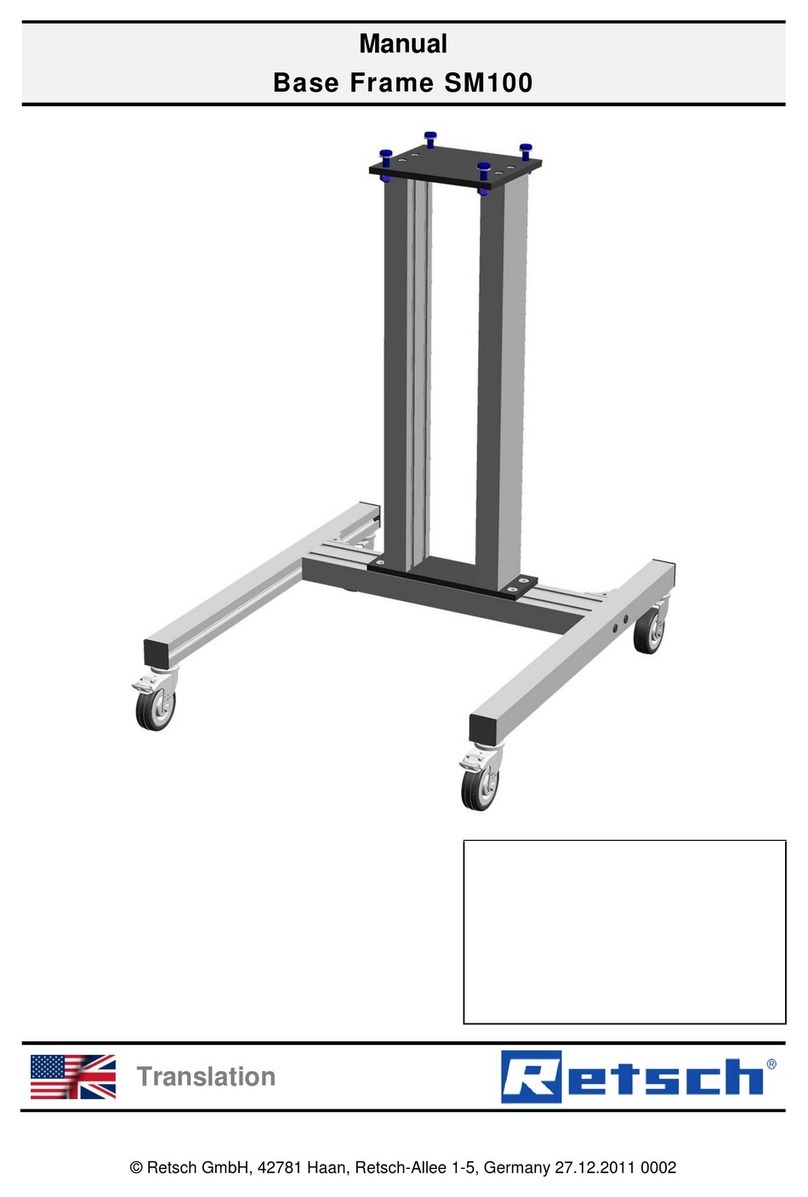
Retsch
Retsch SM100 operating manual
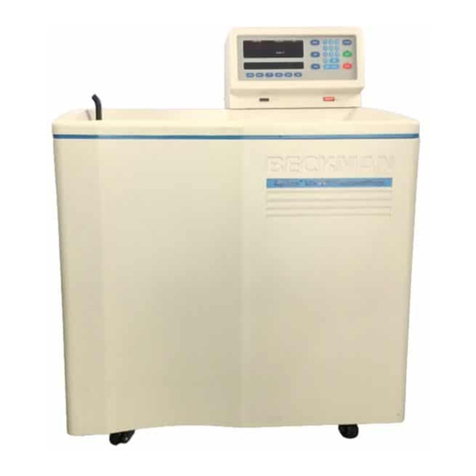
Beckman Coulter
Beckman Coulter Optima LE-80K instruction manual
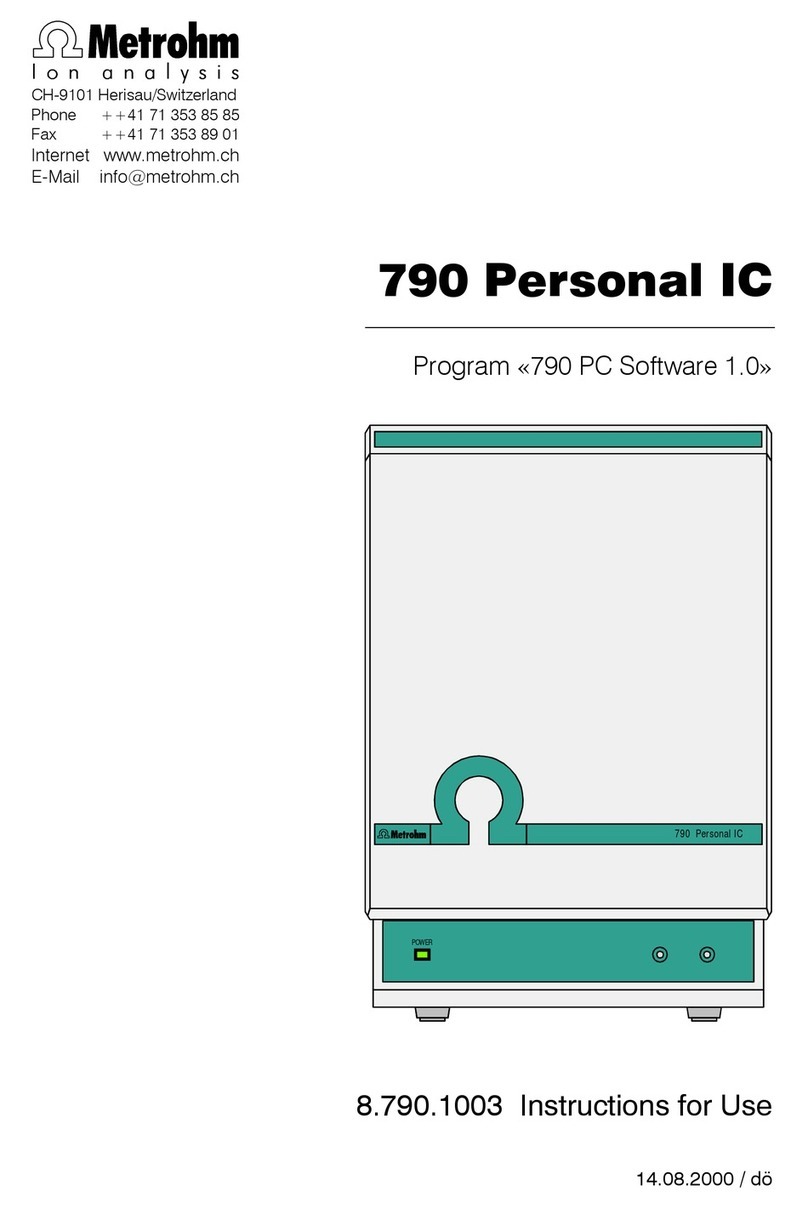
Metrohm
Metrohm 790 Personal IC Instructions for use
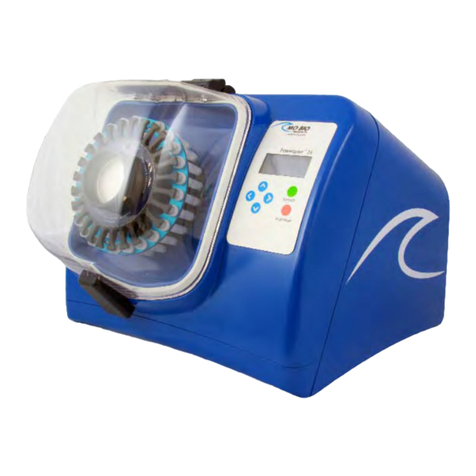
MO BIO Laboratories
MO BIO Laboratories PowerLyzer 12155 instruction manual
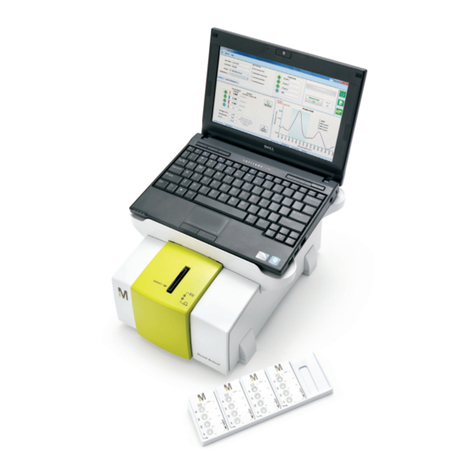
Millipore
Millipore Direct Detect user guide

Powerfiller
Powerfiller Powermax 3+ user manual

